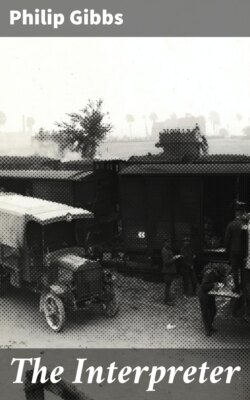Читать книгу The Interpreter - Philip Gibbs - Страница 15
На сайте Литреса книга снята с продажи.
13
ОглавлениеTable of Contents
In the afternoon of that last day in England he went to his house in St. Leonard’s Terrace. He had not been there for some time now, and only then to fetch a few of his books and papers. The broken windows had been repaired, and his old servant went in every day to keep the place clean and free from dust. He was glad to find some freshly cut roses on the shelf below his wife’s portrait by Judy’s husband, Robin—one of his most brilliant works. Katherine Langdon must have done that, he thought. It was kind of her, kind with her usual charming sympathy, but of what avail was it after all? He stood in front of Robin Bramley’s portrait of Anne. She was there as she had looked in life. Bramley had done her eyes marvellously. They had her smile in them, a little haughty perhaps. That is how Robin had seen her, sure of herself with a touch of pride and caste. That was how John had seen her in the first encounters, though afterwards he knew that she was straightforward and simple, without arrogance. Robin had failed a trifle with her mouth. It was not so hard as this, but he had reproduced the texture of her skin and hair with wonderful delicacy. A good portrait, but only a shadow picture; a thing of canvas and pigment, without life—a tragic souvenir of young beauty now dead ... now dead ... now dead.
“Oh Christ!” cried John, alone in his house. He touched things which her hands had touched—the rosewood piano, an ivory paper knife, a long, thin cigarette holder which she had often put to her lips. He put that in his breast pocket.
There was the chair in which she had sat while they played chess on the last night he had spent with her. For a moment he imagined her sitting there with her chin propped on her clasped hands as she studied the chessboard. She had a little smile on her lips as she devised a trap for him.
“Remembrance,” he said aloud. “What’s the good of it? Nothing more than memory. What’s the use of that?”
He strode through all the rooms of the house, lingering a little time in each. The afternoon sun was streaming through the broken window of the bedroom they had shared. It gleamed on the oval mirror of the dressing table where she had sat each morning to do her hair. He stared into this mirror as though he expected to see her face reflected there as often as he had seen it when standing behind her to touch her hair with his lips. But there was only the reflection of his own face, lean, and tanned, and haggard, with tragic eyes.
I’m becoming a repulsive-looking guy, he thought.
He turned away to go out of the room, but as he was about to shut the door behind him he had an extraordinary experience. Somebody spoke to him, he thought, in a kind of loud whisper. He could hear the words—or he imagined he heard the words.
“Speak to me.”
For a moment he stood quite still and rigid. His spine seemed to be touched by an icy finger. He was afraid.
I’m getting morbid, he thought. Perhaps I’m going mad.
He went back into the bedroom and stared around.
“Anne,” he said quietly; “did you call me?”
There was no answer.
“Anne,” he said again, “I’m going to the United States. I’ll try to do a job for England. I’m sure you want me to do it. That’s why I’m going.”
After these words he listened intently, but there was no sound in the room except a faint noise of traffic outside—a taxi passing down St. Leonard’s Terrace and a bus running in the King’s Road.
Barton gave a deep sigh and presently walked out of his house and shut the door softly—it was his house of dreams—and slipped the key into his pocket.
